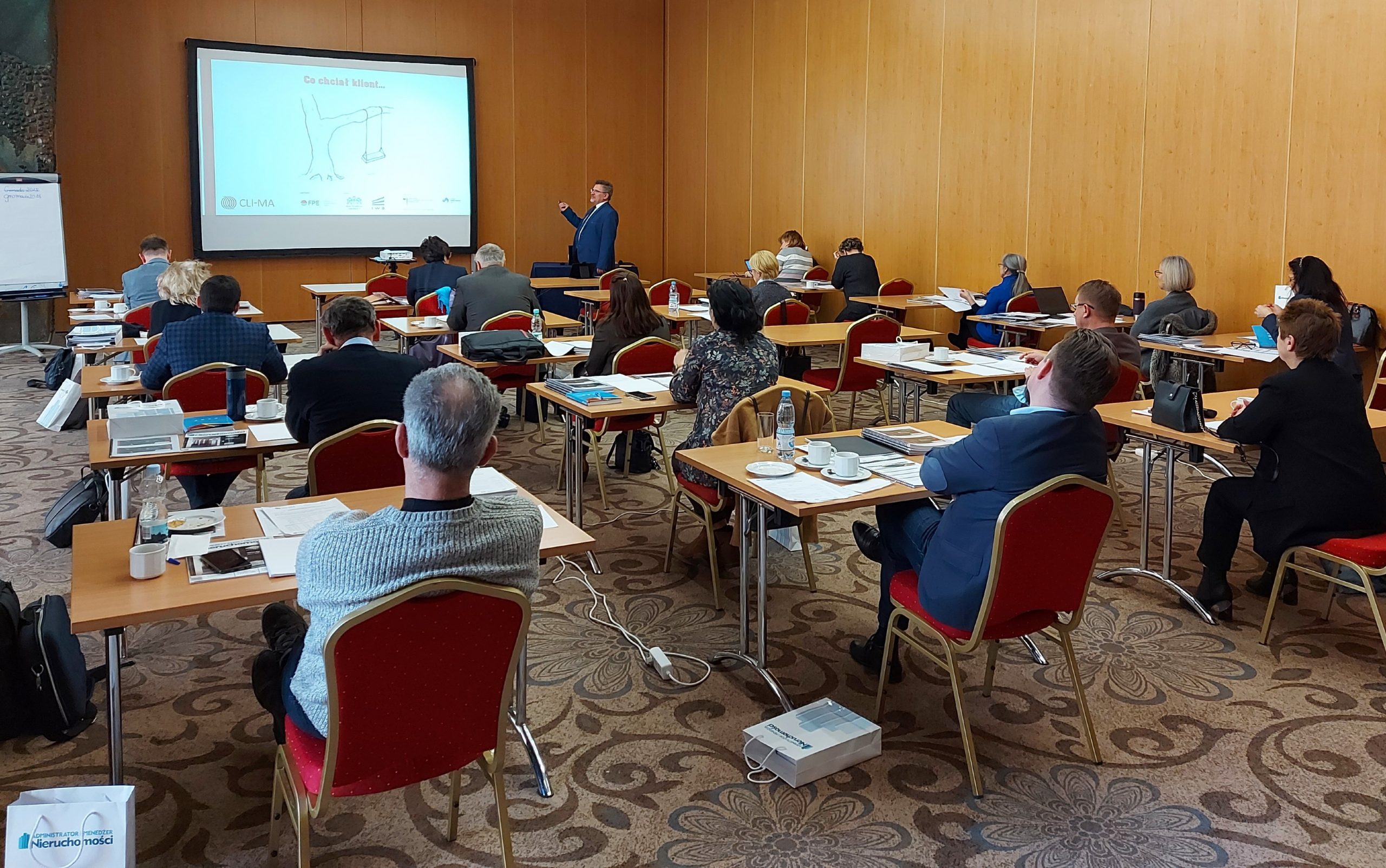From 10th to 12th January pilot training course “Certified Property Manager for Climate Affairs” was conducted by the Energy Conservation Foundation, in collaboration with the Medium Group – editor of the monthly magazine “Administrator and Property Manager” and the website www. administrator24.info.
This three-day training course was part of the project “CLI-MA – From Housing Manager to CLImate MAnager”, co-financed by the European Climate Initiative EUKI and the Energy Conservation Foundation, which is the project leader. The other partners implementing the international project are IWO e.V. – Housing Initiative for Eastern Europe and Riga Technical University. Project partners are supported by organizations associating property managers in Germany, Poland and Latvia.
It is worth adding that the inspiration for the CLI-MA project was the German pilot training course for property managers starting their own business activities, taking into account the issues of energy saving in buildings.
The Polish edition of the course was attended by 20 managers from various Polish cities, who have primarily met the requirement of managing residential real estate for at least 5 years. However the interest in acquiring knowledge about climate management in the building and its surroundings was greater than the possibilities provided for this pilot training, so the order of applications was also decisive for qualifying for the course. Therefore, it is worth adding that there will be further editions of the course, but we will inform you about the dates and rules of participation in them at a later date.
Hard and soft competences
Participants qualified for this three-day training course had the opportunity to listen to lectures within six separate program modules, including the field of law, legal requirements for the modernization of buildings and the improvement of their surroundings, as well as business models in the process of modernization of buildings.
The module dedicated to the analysis of the technical condition of the building and its surroundings was of great interest, of course from the point of view of reducing energy consumption by the building and its users and reducing its negative impact on the environment and climate.
The topics also included planning and decision-making in the process of modernization of buildings, knowledge about the implementation of the “climate” modernization of the building, as well as the methods of financing projects.
The acquired hard competences were supplemented by the soft ones, so necessary in the work of every property manager, especially when not everyone is convinced of investment plans, even those ultimately beneficial for every resident. Then, knowledge about interpersonal communication with residents and the possibility of using various tools of direct and remote communication is useful.
Each of the six modules ended with a test. The Energy Conservation Foundation adopted the principle of passing the test with a minimum score of 70% of correct answers.
Who needs CLI-MA for?
Most of Polish multi-family buildings were put into use several decades ago. The technical solutions used at that time, as well as the applicable technical requirements, were much less restrictive than today. These buildings therefore require modernization, which is favored by, inter alia, Long-term Renovation Strategy.
It states that: “The renovation of the building stock is one of the greatest infrastructural challenges of Poland until 2050. As in other EU Member States, Polish buildings in the long term should be modernized in a manner consistent with the transformation towards a climate-neutral economy. At the same time, however, national public policy must respond to the urgent need to replace the most emitting heat sources in order to improve air quality, while ensuring the economic efficiency of renovation”.
Therefore, not only the declaration of ambitious modernization itself is of particular importance, but also the method of pursuing the goals set out in the Strategy, which can only be achieved with the cooperation of building owners and managers, who should complete such a process by 2050. However, the implementation of these goals requires knowing what, how and for how much can be done to improve the energy standard of buildings, with the greatest economic effect for residents.
Meanwhile, the current system of functioning of the property managers’ market is not conducive to the obligatory improvement of professional qualifications, and the conducted social research has shown that the areas most frequently indicated by managers to expand their competences are basic knowledge in the field of energy efficiency of buildings (21% of responses) and knowledge about acquiring and using funds for investments related to improving the energy efficiency of buildings (19% of responses).
In a word, there is a lack of knowledge of property managers and administrators about the negative impact of multi-family housing on climate change, how to limit it, and about financial instruments that can be used in the implementation of modernization projects. The aforementioned project, which was created as part of the European Climate Initiative (Europäische Klimaschutzinitiative EUKI), implemented from October 2020 to March 2023, the project “CLI-MA – From Housing Manager to CLImate Manager” turned out to be a support.
The main task of this project is to develop a training system for property managers, allowing them to supplement their knowledge of the above-mentioned thematic areas and showing the impact of building modernization on the quality of indoor climate in buildings and should contribute to a positive change in the education market of property managers.
Source: Administrator i Menedżer Nieruchomości, wyd. 1-2/2022

